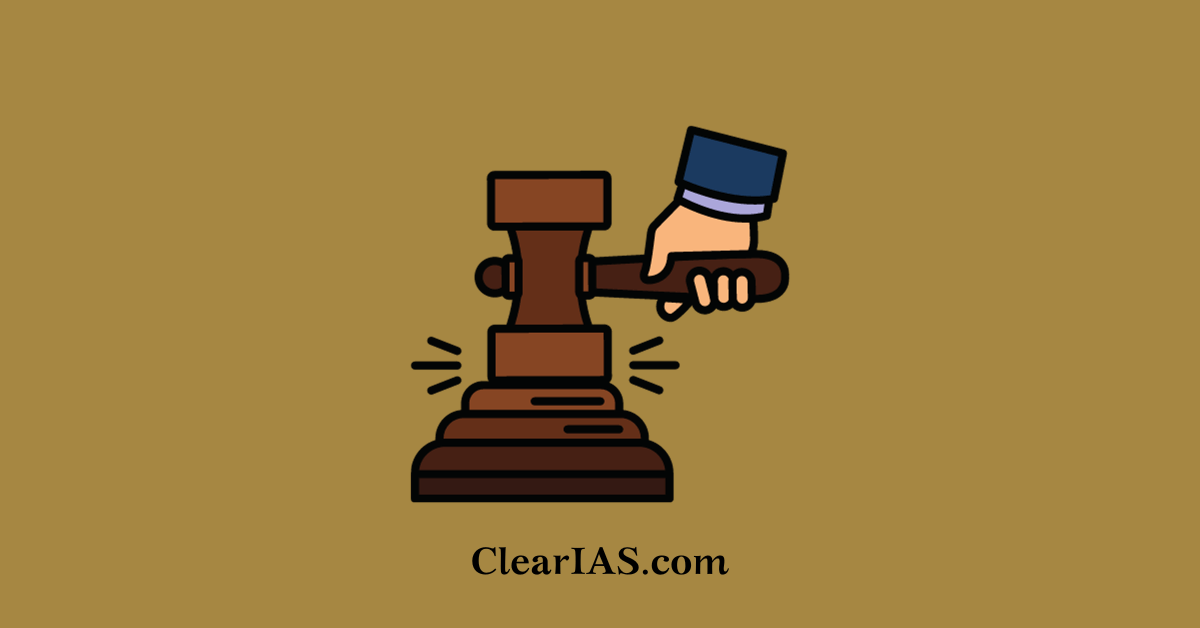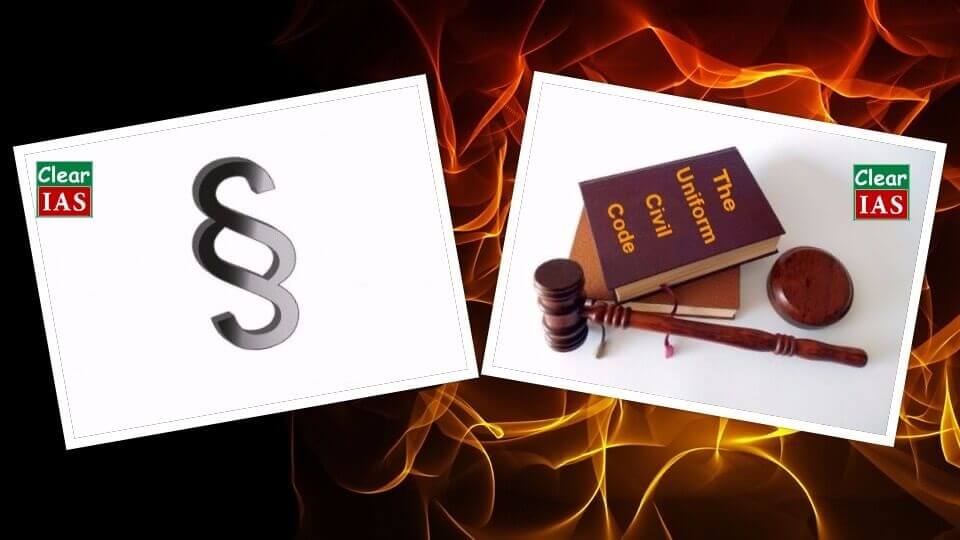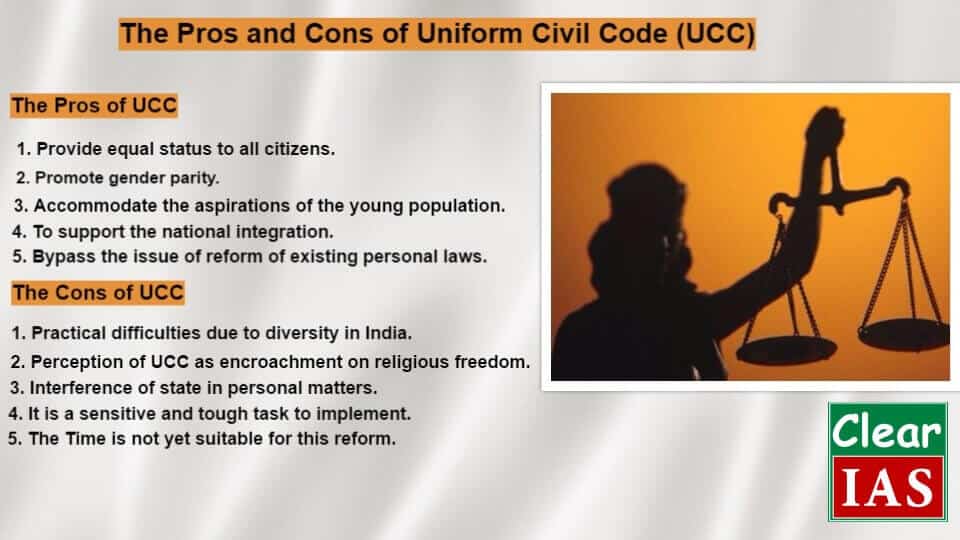
The Union law ministry has recently asked the law commission to examine the matters about the implementation of the uniform civil code.
What is the Uniform Civil Code?

The Uniform Civil Code (UCC) in India proposes to replace the personal laws based on the scriptures and customs of each major religious community in the country with a common set governing every citizen.
Is there a provision in the Indian constitution for a Uniform Civil Code (UCC)?
The constitution has a provision for a Uniform Civil Code in Article 44 as a Directive Principle of State Policy which states that “The State shall endeavor to secure for the citizens a uniform civil code throughout the territory of India.”
After its liberation in 1961, Goa retained the Portuguese Civil Code, making it the only state to have a UCC for all religions.
2024: Uttarakhand assembly has passed the uniform civil code bill, hence this becomes the first state in the country after independence to adopt UCC.
- Constitutional Mandate: Article 44 says that the State shall endeavor to secure for citizens a uniform civil code throughout the territory of India.
- Objective: The Bill proposes a common law on marriage, divorce, land, property, and inheritance for all citizens irrespective of their religion in Uttarakhand.
- Provisions of the UCC Bill do not apply to tribal communities.
- Bill aims to regulate live-in relationships.
- Bill prohibits bigamy or marriages with more than one person etc.
What are the Pros of the Uniform Civil Code?
To provide equal status to all citizens
In the modern era, a secular democratic republic should have common civil and personal laws for its citizens irrespective of their religion, class, caste, gender, etc.
To promote gender parity
It is commonly observed that personal laws of almost all religions are discriminatory towards women. Men are usually granted upper preferential status in matters of succession and inheritance. A uniform civil code will bring both men and women to par.
To accommodate the aspirations of the young population
Contemporary India is a new society with 55% of its population being below 25 years of age. Their social attitudes and aspirations are shaped by universal and global principles of equality, humanity, and modernity. Their view of shedding identity based on any religion has to be given serious consideration to utilize their full potential for nation-building.
To support the national integration
All Indian citizens are already equal before the court of law as the criminal laws and other civil laws (except personal laws) are the same for all. With the implementation of the Uniform Civil Code, all citizens will share the same set of personal laws. There will be no scope for politicization of issues of discrimination or concessions or special privileges enjoyed by a particular community based on their particular religious personal laws.
To bypass the contentious issue of reform of existing personal laws
Existing personal laws are mainly based on the upper-class patriarchal notions of society in all religions. The demand of UCC is normally made by aggrieved women as a substitute for existing personal laws as patriarchal orthodox people still deem the reforms in personal laws will destroy their sanctity and oppose it profusely.
What are the Cons of the Uniform Civil Code?

Practical difficulties due to diversity in India
It is practically tough to come up with a common and uniform set of rules for personal issues like marriage due to the tremendous cultural diversity in India across religions, sects, castes, states, etc.
Read: Personal laws in India
Perception of UCC as encroachment on religious freedom
Many communities, particularly minority communities perceive Uniform Civil Code as an encroachment on their rights to religious freedom. They fear that a common code will neglect their traditions and impose rules that will be mainly dictated to and influenced by the majority of religious communities.
Interference of state in personal matters
The constitution provides for the right to freedom of religion of one’s choice. With the codification of uniform rules and its compulsion, the scope of the freedom of religion will be reduced.
Sensitive and tough task
Such a code, in its true spirit, must be brought about by borrowing freely from different personal laws, making gradual changes in each, issuing judicial pronouncements assuring gender equality, and adopting expansive interpretations on marriage, maintenance, adoption, and succession by acknowledging the benefits that one community secures from the others. This task will be a very demanding time and human resource-wise. The government should be sensitive and unbiased at each step while dealing with the majority and minority communities. Otherwise, it might turn out to be more disastrous in the form of communal violence.
Time is not yet suitable for this reform
Considering the major opposition from the Muslim community in India over this issue overlapping with controversies over beef, saffronization of school and college curriculum, love jihad, and the silence emanating from the top leadership on these controversies, there needs to be given sufficient time for instilling confidence in the community. Otherwise, these efforts towards common will be counterproductive leaving the minority class particularly Muslims more insecure and vulnerable to get attracted towards fundamentalist and extremist ideologies.
Conclusion
- At the end of the day, a UCC can only emerge through an evolutionary process, which preserves India’s rich legal heritage, of which all the personal laws are equal constituents.
- The codification and implementation of UCC may not necessarily usher in the expected equality among genders and religions.
- Major sensitization efforts are needed to reform current personal law reforms which should first be initiated by the communities themselves.
- Current institutions need to be modernized, democratized and strengthened for this change. Sincere efforts towards women’s empowerment have to be taken for all women of all religions.
- The plural democracy is an identity of modern India. Therefore, efforts should be focused on harmony in plurality rather than blanket uniformity for a flourishing Indian democracy.
Article by: Manjiri Mulye.






Can u make an app for hindi medium students in hindi language for ias
Please make notes for hindi medium students
Please make an android and ios supporting application for mobile phone users………..
Thanx nation builders…
Good article
Uniform civi code is a universal reality .the only grey area is sharia law . Like Hindu law and Christian personnel law ,even in sharia law the sole guardianship of a child below five years of age is the child’s mother alone and if the child’s mother marries another person other than the child’s father before the child attains five years of age loose the guardianship of the child unequivocally and the child is designated an orphan with state taking over the legal guardianship till she opts to choose her biological father as guardian after crossing
the child’s five years of age .this clearly shows that all personnel laws are having a common essence . The debate in implementing universal common civil code for all citizens should be completed this year with the introduction of the much awaited Bill in parliament with a provision for sharia laws to prevail incase of a conflict , if a question of law is raised in court and not as a general option for citizens of India which should alone be the civil code .
The best i hv site ever used for ias preparation . Detail description and analysis helps in understanding to the depth
Very much helpful article….Thank you
nice article …. very useful
Sigi article si khra adum yara UCC gidi.
Good informative article
Conclusion is utter nonsense. It is very diplomatic conclusion unregard to needs and threats.
We don’t require uniform civil ciddi
You don’t requird uniform civil code . We will not get to rights because of this . We went to live in muslim way only thnxx
BEFORE IMPLEMENTATION OF THE UCC, BOTH MUSLIM ORGANIZATIONS AND PRESENT GOVERNMENT SHALL MEET TOGETHER TO SEE THE PROS AND CONS OF THE UCC.
UCC IS AN BREACH FOR THE RELIGIOUS LAWS
WE DONT WANT IT
RELIGIOUS FREEDOM IS MUST
Uniform Civil code is a must, and will level the treatment of all citizens as equal, and it can and must be done in a way where the practices of all religions can be respected without gevernmant interference.
Nice article sir
Whether the Uniform Civil Code Uttrakhand 2024 shall apply / govern on the agricultural lands in Uttarakhand.